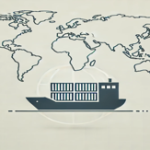Global trade is the lifeline of the modern economy, connecting businesses and consumers across borders. But with it comes the challenge of navigating complex regulations, taxes, and logistics. Enter customs warehousing, a game-changer for companies aiming to simplify trade processes while keeping costs in check. In this article, we explore the indispensable role of customs warehousing in making global trade faster, smoother, and more efficient.
What is Customs Warehousing?
Customs warehousing is like a safety net for international trade. Think of it as a designated storage facility where imported goods can be held without immediately paying duties or taxes. This storage continues under customs control until the goods are released for consumption, exported, or otherwise disposed of according to regulations.
For businesses, customs warehousing provides breathing space. Instead of being bogged down by immediate tax obligations, companies can focus on supply chain management and market demands. It’s like hitting the pause button on a complicated process, giving you time to strategize without unnecessary financial strain.
Key Benefits of Customs Warehousing
1. Duty Deferment
One of the most appealing benefits is the ability to defer duties and taxes. Importers can store goods until they are ready for market release. This not only improves cash flow but also aligns payments with actual sales. Why pay upfront when you can pay later, right?
2. Flexibility in Distribution
Customs warehousing allows businesses to break bulk shipments and repackage goods for specific markets. This flexibility ensures that products meet the varying needs of international consumers without redundant costs. Imagine having a wardrobe for your products—organized, efficient, and ready for any occasion.
3. Minimized Risk
By storing goods in a customs warehouse, businesses reduce risks associated with fluctuating demand. If market conditions change, unsold goods can be re-exported without incurring additional taxes. It’s like a get-out-of-jail-free card for your inventory.
How Customs Warehousing Streamlines Global Trade
1. Facilitating Seamless Supply Chains
Efficient supply chains depend on timing and cost control. Customs warehousing acts as a central hub, ensuring goods are readily available without unnecessary delays. Companies can time the release of goods to match market demand, preventing bottlenecks and maximizing profitability.
2. Enhancing Inventory Management
Inventory management can make or break a business. Customs warehouses enable companies to consolidate shipments, store surplus inventory, and monitor stock levels under one roof. It’s like having a highly organized pantry—everything is accounted for and accessible when needed.
3. Simplifying Export Processes
Goods stored in customs warehouses can be easily re-exported without undergoing lengthy customs procedures. This is especially useful for businesses involved in transshipment. For instance, a company importing electronics to Europe can quickly redirect unsold units to Asia if demand spikes there. Flexibility equals opportunity.
Real-World Applications of Customs Warehousing
1. Automotive Industry
The automotive sector relies heavily on customs warehousing for spare parts and components. Manufacturers store imported parts until they are needed on assembly lines, ensuring production schedules remain uninterrupted.
2. Pharmaceuticals
In the pharmaceutical industry, time-sensitive goods like vaccines benefit from customs warehousing. Warehouses equipped with cold storage ensure compliance with regulations while keeping products safe and accessible.
3. E-commerce Giants
E-commerce platforms leverage customs warehouses to manage global orders efficiently. By storing goods close to consumer markets, companies like Amazon and Alibaba reduce delivery times and enhance customer satisfaction. Speed, after all, is the name of the game.
Challenges and Solutions in Customs Warehousing
1. Regulatory Compliance
Navigating the rules of multiple jurisdictions can feel like solving a Rubik’s Cube blindfolded. Businesses must stay updated on customs regulations to avoid penalties. Partnering with experts or using automated customs software can ease the burden.
2. High Operational Costs
Maintaining a customs warehouse isn’t cheap. However, the long-term savings on duties, taxes, and logistical inefficiencies often outweigh the initial investment. Plus, with proper planning, businesses can optimize operations to minimize costs.
3. Technology Integration
Many businesses struggle with integrating warehouse management systems (WMS) into their operations. A robust WMS tailored to customs warehousing can streamline inventory tracking and regulatory compliance, turning challenges into opportunities.
Future Trends in Customs Warehousing
1. Automation and AI
The future of customs warehousing lies in automation. AI-powered systems can predict market demands, optimize storage, and automate compliance documentation. Imagine a warehouse that thinks for itself—efficiency at its best.
2. Sustainability in Warehousing
Green initiatives are making their way into customs warehousing. Solar-powered facilities and eco-friendly packaging are no longer optional—they’re becoming the norm. It’s about time warehouses joined the sustainability bandwagon.
3. Blockchain for Transparency
Blockchain technology promises greater transparency in global trade. By integrating blockchain, customs warehouses can offer real-time updates on goods, reducing disputes and enhancing trust across supply chains.
Conclusion
Customs warehousing is more than a logistical tool; it’s a strategic asset for businesses navigating the complexities of global trade. By deferring duties, enhancing flexibility, and simplifying processes, these facilities unlock opportunities that were previously out of reach.
So, whether you’re an automotive giant, a pharmaceutical innovator, or an e-commerce powerhouse, embracing customs warehousing might just be the smartest move you’ll make this year. After all, why swim against the current when you can surf the wave?
You can contact us on WhatsApp to discuss this topic further.




